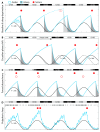Timing Mechanisms for Circadian Seizures
- PMID: 39449314
- PMCID: PMC11503444
- DOI: 10.3390/clockssleep6040040
Timing Mechanisms for Circadian Seizures
Abstract
For centuries, epileptic seizures have been noticed to recur with temporal regularity, suggesting that an underlying biological rhythm may play a crucial role in their timing. In this review, we propose to adopt the framework of chronobiology to study the circadian timing of seizures. We first review observations made on seizure timing in patients with epilepsy and animal models of the disorder. We then present the existing chronobiology paradigm to disentangle intertwined circadian and sleep-wake timing mechanisms. In the light of this framework, we review the existing evidence for specific timing mechanisms in specific epilepsy syndromes and highlight that current knowledge is far from sufficient. We propose that individual seizure chronotypes may result from an interplay between independent timing mechanisms. We conclude with a research agenda to help solve the urgency of ticking seizures.
Keywords: circadian; epileptic seizures; sleep.
Conflict of interest statement
The authors declare no conflict of interest.
Figures

References
-
- Griffiths G.M., Fox J.T. Rhythm in Epilepsy. Lancet. 1938;232:409–416. doi: 10.1016/S0140-6736(00)41614-4. - DOI
-
- Langdon-Down M., Brain W.R. Time of Day in Relation to Convulsions in Epilepsy. Lancet. 1929;213:1029–1032. doi: 10.1016/S0140-6736(00)79288-9. - DOI
-
- Gowers W.R. Epilepsy and Other Chronic Convulsive Diseases: Their Causes, Symptoms and Treatment. Kessinger Publishing; London, UK: 1881.
Publication types
LinkOut - more resources
Full Text Sources

